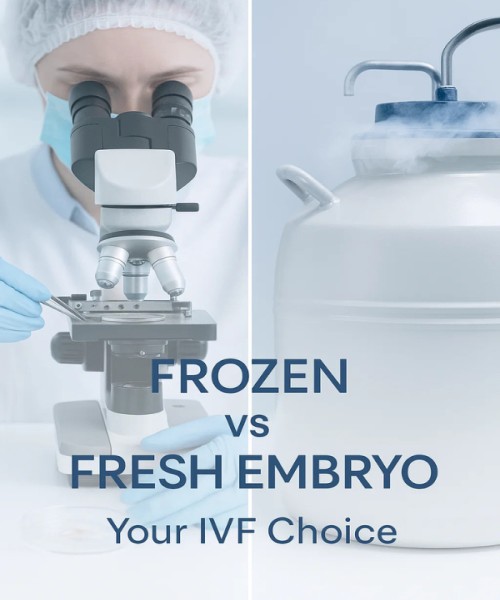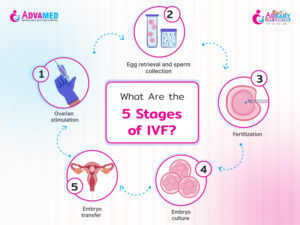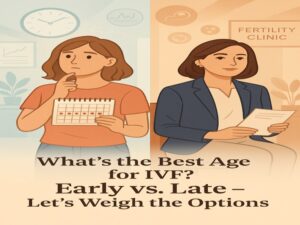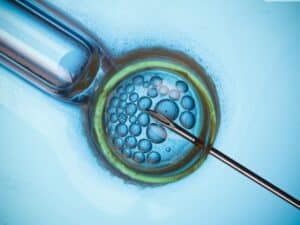So you’ve made it this far on your fertility journey – and now your doctor throws another curveball: “Do you want to go for a fresh embryo transfer or a frozen one?”
If your first reaction was: “Wait, I get to choose?” you’re not alone.
In the evolving world of IVF, this choice is becoming more common and more confusing. So let’s break it down, step by step, with you in the driver’s seat.
First Off: What’s the Difference, Anyway?
Here’s the quick version:
- Fresh Embryo Transfer: Your embryos are transferred a few days after egg retrieval, during the same cycle.
- Frozen Embryo Transfer (FET): Your embryos are frozen (vitrified) and transferred in a later cycle.
That’s it in terms of timing. But you already guessed – the decision isn’t just about timing. It’s about your body, your hormones, and your unique situation.
Why Fresh Cycles Might Be Your Jam
Fresh transfers were the original method. You’ve likely heard stories like:
“I had a fresh transfer and now have a two-year-old who never stops running!” – Shared on BabyCenter forums.
Pros:
- Faster time to potential pregnancy (no waiting to thaw!)
- Less cost upfront since there’s no freezing/storage
But… Be Cautious If:
- You’re at risk of OHSS (Ovarian Hyperstimulation Syndrome)
- Your hormone levels are off after stimulation (making your uterus less welcoming)
- Your doctor wants to perform genetic testing, which usually needs time – hence freezing.
Why Frozen Might Be Cooler (Pun Fully Intended)
FET has been gaining popularity. And not just because frozen is the new fresh – research backs it up in certain cases.
A 2018 study published in the New England Journal of Medicine found that women with PCOS had higher live birth rates and lower OHSS risks with frozen transfers.
Pros:
- Your body has time to recover from stimulation
- Better synchronization between your uterine lining and embryo
- Flexibility to do PGT (Preimplantation Genetic Testing)
- Often fewer complications in high responders or PCOS patients
But… Keep In Mind:
- It’s not necessarily better for everyone
- You’ll have to wait longer (cue the nail-biting)
- Slightly higher cost due to freezing and storage
So… Which One Should You Choose?
Let’s be real: you’ll probably make this decision alongside your fertility specialist, not in a blog comment section. But here’s a cheat sheet:
|
Your Situation |
Likely Better Choice |
|
Normal hormone response, no PCOS or OHSS risk |
Fresh |
|
PCOS, high responder, or hormone imbalance |
Frozen |
|
Doing genetic testing |
Frozen |
|
Wanting the fastest possible chance |
Fresh (if safe) |
Still stuck? Dr. Nupur Sharma, IVF specialist at AdvaMed Hospital & Adbaby IVF Centre, puts it like this:
“Frozen embryo transfers give us a chance to optimize the uterine environment, especially in women with complex hormonal responses. But the decision is always tailored – what works for one might not work for another.”
What Are Real People Saying?
Head over to Reddit’s r/IVF or any TTC (Trying to Conceive) forum and you’ll see:
- Some rave about FET because their fresh cycle failed but FET worked.
- Others loved fresh because they didn’t want to wait or pay more.
One Patient said:
“I called my frozen baby my ‘microwaved miracle’ -took two tries, but he’s finally here!”
Looking Ahead: What Might Change?
IVF is rapidly evolving. Lab freezing techniques (like vitrification) are improving, so success rates for FET are now equal to or better than fresh cycles in many clinics.
But we still don’t know everything. More studies are being done, especially on long-term outcomes. It’s possible future IVF will default to frozen for most people — but we’re not quite there yet.
Final Thoughts (A.K.A. You’ve Got This)
Choosing between frozen and fresh might feel like choosing between tea and coffee — both will wake you up, but one might suit your body better.
Your best bet? Ask lots of questions, understand your body’s response, and trust your fertility team.
Whatever path you choose – fresh or frozen – you’re not alone. Thousands have walked this road before, and many have ended up with adorable chaos at home.











